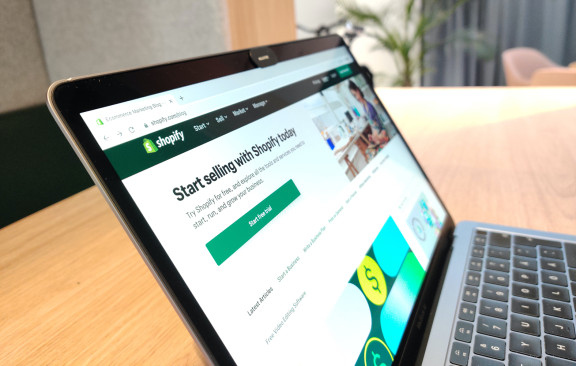Shopify has rolled out the early access of Shopify Markets to help merchants sell to new audiences.
Before Shopify Markets, you needed to sell on a marketplace or partner with a third-party retailer to reach international customers.
Shopify Markets enable you to sell to international consumers and avoid complex issues around currency conversion, import duties, local payment methods, and language translation.
It promises a lot, but does it live up to the hype?
Let’s find out in our Shopify Markets Review.
What Is Shopify Markets?
Shopify Markets is a significant update to the e-commerce platform to help cross-border merchants.
By 2025, the global e-commerce market is set to be worth $6.38 trillion:

There is a massive opportunity for e-commerce merchants to capitalize on the boom in online sales. You can get your products in front of customers all over the globe.
But there are challenges with selling in international markets.
Currency conversion, language barriers, logistics, and other issues can be time-consuming and complicated.
Shopify Markets aims to provide solutions to the problems of cross-border selling.
Shopify Markets Features
Shopify Markets offers a range of features to make selling to international customers a whole lot easier.
Currency Conversion
The ability to pay for a product in a local currency is a decisive factor in conversion rates. Shopify estimates that stores that offer local currency pricing increase conversion rates by up to 40%.
Shopify Markets offers automatic currency conversion in over 130 currencies. Your storefront prices are automatically adjusted and rounded based on the latest exchange rate:

It’s not just product pages that offer localized pricing.
The checkout process and the notifications and refunds process are shown in the local currency.
This is a great feature that takes out a lot of the hassle of selling internationally. It could also make a big difference when it comes to conversions.
Language Translation
Being able to offer content and product details in the local language is vital for breaking into new markets. According to a recent survey, 40% of people won’t buy from an online store in a different language.
Shopify Markets uses third-party apps to translate your store content and copy.

In the near future, Shopify also plans to release native translation support to ensure that nothing is lost in translation.
Language translation works across every page of your storefront and checkout process.
The language barrier used to be one of the most significant barriers when it came to selling internationally. You needed to hire a native-speaking copywriter or partner with a third-party retailer.
With Shopify Markets, you can overcome that problem in a few clicks.
International Domains
Having an international domain for your store can boost your SEO and increase your organic reach. It can also help to improve your credibility and increase conversions.
Shopify Markets enables you to create region or country-specific domains easily.
For example, if you want to open a market in Australia, your store can be at mystorefront.com/en-au.
There’s also the option of creating a subdomain, like au.mystorefront.com, or a country-specific domain, like mystorefront.com.au.
After choosing your regional domain strategy, Shopify will automatically generate SEO tags to help you get found in the search results.
If a visitor navigates to the wrong domain, Shopify will use their IP address to direct them to the right storefront for their location.
Payment Methods
Payment methods are one of the most overlooked factors for boosting cross-border sales.
Online shoppers have payment method preferences that depend on their location:
- In the US, 82% of online shoppers prefer credit and debit cards as their preferred payment method.
- In Europe, 80% of people prefer using a payment processor like PayPal or Alipay.
- In the Netherlands, the iDEAL online bank transfer system is by far the most popular payment method for online shoppers.
Shopify Markets suggests the most popular payment methods for the region and lets you take payment from your customers using their preferred method.
Calculate Duty and Import Taxes
Every online shopper wants to know exactly how much a product will cost before completing the checkout process.
One of the biggest challenges for e-commerce stores in global markets is providing this information upfront before the shopper clicks buy now.
You need to know the duties and import taxes that could increase the total cost of your products.
Shopify Markets automatically compiles this information and collects the duty and import taxes due at the checkout.
Your customers can see the total cost of the item and avoid any delivery problems or additional charges when receiving their order.
Shopify Markets Dashboard
Shopify Markets makes cross-border selling simple by bringing all of the important information and options you need into a single dashboard.
You can control all of your storefronts from one place. It also provides smart recommendations to help you scale your business and make the most of opportunities in new markets.
Customizable Market Options
Depending on your products, it may make more sense to sell to larger regions than individual countries.
For example, you can create a storefront for the European Union instead of creating a separate storefront for each of the 27 member countries.
Shopify Markets makes it super-easy to set up markets and choose regions.

You also have the option of customizing your storefront for buyers from different countries in those markets.
For example, if you set up a market for Asia Pacific, you can still show pricing in the local currency for shoppers in each country.
International Pricing Configuration
Shopify Markets can automatically convert your pricing into the local currency. But sometimes, you may need to do more than simply convert your prices.
For example, your primary market pricing strategy might be different from your secondary market strategy.
In your primary market, you may already have an established customer base that allows you to maximize your margins.
In the secondary market, you might want to lower your margins to attract new customers.
Shopify Markets offers complete pricing control. You can adjust your pricing for each market directly within the dashboard.
Inventory and Fulfillment Control
Shopify Markets will automatically show customers the inventory you can ship to their location.
For example, if you have a fulfillment partner in France that ships exclusively to the EU, shoppers in that market will only see available inventory from that partner.
This allows you to avoid situations where an order is placed and cannot be fulfilled. Shopify Markets automatically adjust your storefront inventory according to product availability in the market.
Smart Settings
Selling to a bunch of new markets might feel a bit overwhelming at first.
How will you keep track of the best practices and strategies for each market?
Shopify uses its vast amount of sales data to help you.
Smart settings monitor your performance and make automatic optimizations to help you sell more.
If you prefer to stay in complete control, you can switch off smart settings within the dashboard.
There’s very little data to see how useful this feature is, but it will be interesting to see its impact on conversions.
International Selling With Shopify
With Shopify Markets, it’s never been easier to sell to international customers.
You get the intuitive set-up and store management you expect from Shopify, but with some handy new features.
Shopify Markets offers solutions to the most significant pain points of cross-border selling. It does away with the need for multiple third-party apps, bringing everything into a single dashboard.
If you’re thinking about expanding into new markets, Shopify Markets is the easiest way to get started.
We’d love to hear what you think about the rollout of Shopify Markets.
Are you going to sign up for an early access account? Which new features do you think will be the most useful?
Let us know by leaving a comment below right now.











